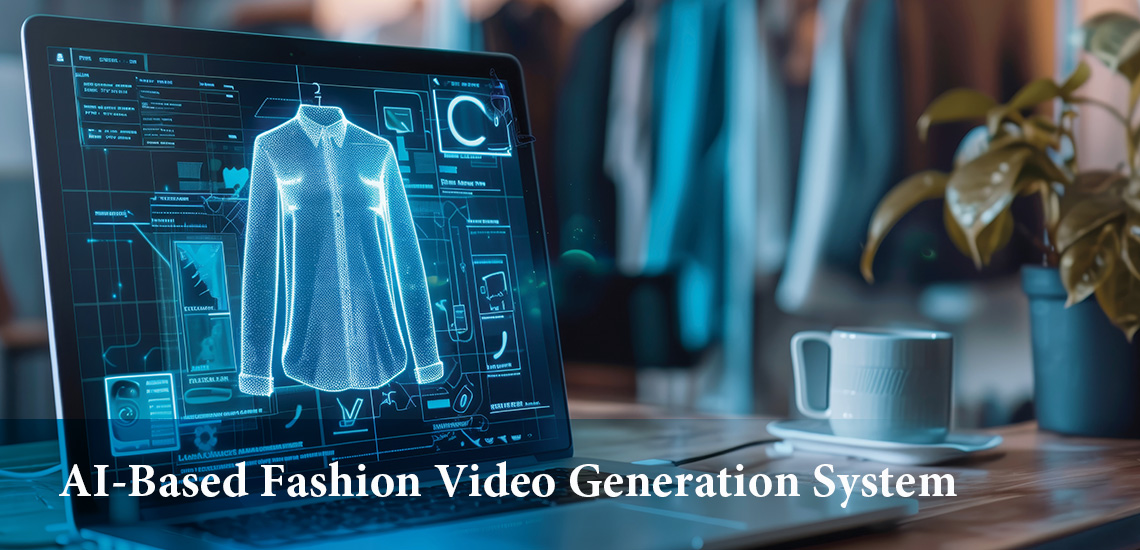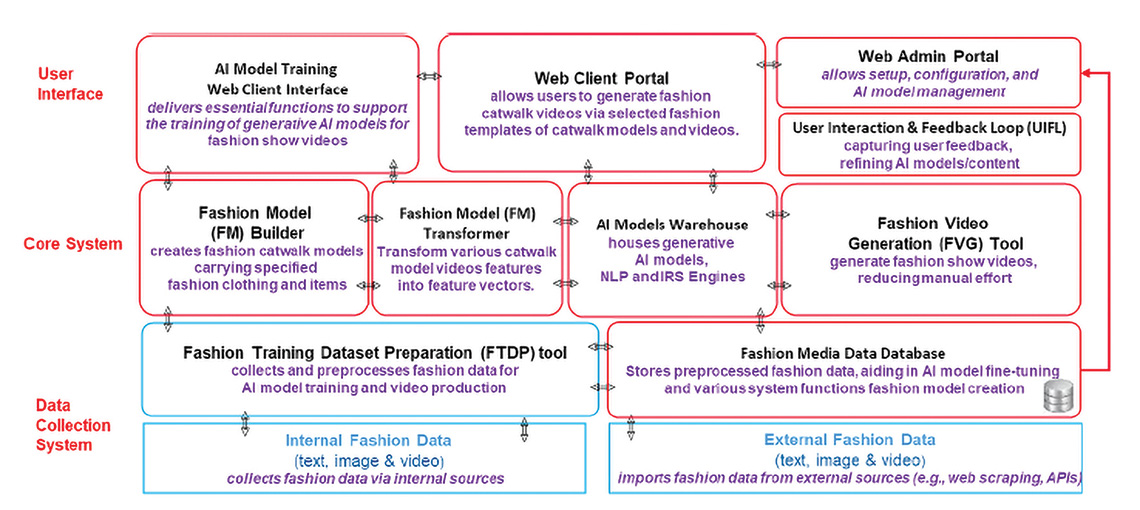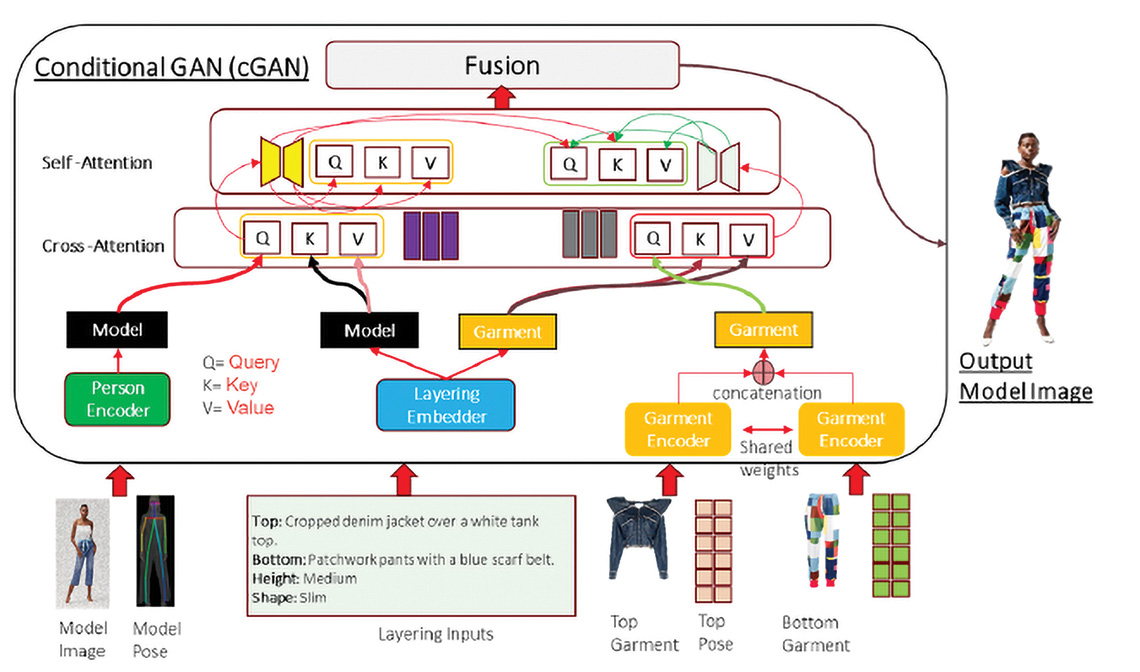
|
Funded by:
Innovation and Technology Fund under the Innovation and Technology Commission of the HKSAR Government
Collaboration:
The Hong Kong Research Institute of Textiles and Apparel
Period:
31 March 2025 – 30 September 2026 (18 months)
Total project amount:
HK$1,568,508
Project Background
Creating engaging fashion videos traditionally involves high costs, lengthy production times, and limited personalisation. This can be a major hurdle for fashion brands, especially with the rapid pace of today’s trends and the growing demand for unique content. Building on research in generative AI (GenAI) for fashion design (Ngai et al., 2025*), notably the Intelligent Inspiration Image Generation Platform (I3GP), our team is developing an AI-Based Fashion Video Generation System (AI-FVGS). This innovative system addresses the key pain points in traditional fashion video production by automating the creation of dynamic and personalised fashion videos, providing a powerful tool for marketing, e-commerce, and digital design.
|
 |
Prof. Eric W.T. Ngai
Distinguished Research Professor, Department of Management and Marketing
|
 |
Prof. Brian Kei
Professor of Practice (Fintech), School of Accounting and Finance |
Project Aim
Our primary goal is to design and develop the AI-FVGS, a system that uses GenAI technologies to:
- Automate personalised fashion video creation by generating unique videos tailored to specific needs.
- Support digital fashion marketing by providing efficient tools for online promotion.
- Enable efficient and engaging virtual showcases by creating compelling virtual experiences for customers.
Project Objectives
To achieve our aim, we are focusing on these key objectives:
- Develop core AI modules: Build the AI components needed to create realistic fashion catwalk videos.
- Enable customisation: Allow designers and marketers to easily generate videos with various customised model appearances and clothing styles.
- Streamline workflow: Create tools that simplify fashion data preparation, transform models for different looks, and render high-quality videos.
- Ensure flexibility: Design the system to be scalable, support diverse representations (ethnicity, body type, style), and be user-friendly.
Project Plan
The project is structured into four main phases:
Phase 1: System Design
- Conduct stakeholder interviews to understand their needs and define what the system should do.
- Deliver the System Requirement Study Report.
Phase 2: Data Collection and AI Model Development
- Build the Fashion Media Data Database containing 20,000 labelled text, image, and video sets. This is crucial for training our AI.
- Develop key AI tools including the Fashion Model Transformer, Fashion Model Builder, and Fashion Video Generation Tool.
Phase 3: System Development and Prototype Integration
- Combine all the individual AI modules into a working system prototype.
- Enable users to select garments, customise models, set backgrounds, and generate videos.
Phase 4: Pilot Run and Final Optimisation
- Conduct a six-month trial with pilot users to test the system.
- Evaluate the system performance using automated metrics and gather feedback from users.
- Prepare technical manuals, case studies, and patent applications.

Figure 1: System Architecture of AI-Based Fashion Video Generation System (AI-FVGS)

Figure 2: Fashion Model Building Process
Project Progress (as of Month 3)
We have already made significant headway:
- Phase 1 is complete: We have delivered the initial requirement study and system design report.
- Phase 2 is in progress: We are currently developing a prototype of the Fashion Training Dataset Preparation Tool. We are actively collecting and preprocessing the text, image, and video data needed to train our AL models.
- We have also started planning for Phases 3 and 4, focusing on module development and structuring our dataset for optimal use.
Next Steps
Our immediate focus includes:
- Completing the Fashion Training Dataset Preparation Tool.
- Continuing to collect and preprocess the remaining fashion media data to reach our target of 20,000 entries.
- Beginning the development of the core AI modules: the Fashion Model Builder and Fashion Model Transformer.
- Establishing the AI Models Warehouse and Media Database to store our trained models and data efficiently.
Implications of Findings
The AI-FVGS promises significant benefits for both the fashion industry and academic research:
Industry Implications
- Enhanced Efficiency and Cost Reduction: The AI-FVGS will automate video creation for fashion promotion, significantly cutting down on the need for manpower and reducing production costs.
- Accelerated Time-to-Market: It will enable rapid content generation, allowing fashion brands to quickly respond to fast-changing fashion trends and bring new styles to market faster.
- Scalable Customisation: Fashion brands will be able to easily tailor video content for different customer groups by varying model features and garments, creating highly-personalised marketing.
- Market Competitiveness: The AI-FVGS will offer SMEs and e-commerce businesses affordable access to high-quality marketing tools, thereby levelling the playing field.
Academic and R&D Implications
- Cross-Disciplinary Innovation: This project combines cutting-edge AI technologies (such as natural language processing, computer vision, and generative AI) with fashion design and marketing research. It showcases a truly integrated approach in applied research.
- Training and Talent Development: It provides invaluable hands-on training opportunities for PolyU students and researchers in AI model development, dataset preparation, and system integration.
- Knowledge Transfer and IP Creation: The project will lead to the creation of intellectual property, including software code, datasets, and algorithms. This could result in patents, publications, and licensing opportunities.
- Platform for Further Research: The system will establish a scalable infrastructure that can serve as the foundation for future research in AI-based digital fashion, personalised design, and human–computer interaction.
- International Collaboration Potential: This research lays the groundwork for engaging with overseas institutions and companies on fashion AI development, thereby boosting FB’s global academic visibility.
Reference
* Ngai, E. W. T., Lee, M. C. M. and Kei, B. C. W. (2025), A Generative Artificial Intelligence (GenAI) System for Fashion Design: A Case Study, IEEE Transactions of Technology Management, Vol. 72, 1320–1333. doi.org/10.1109/TEM.2025.3554248








